
The Code of Tipu Sultan
Was King Of Srirangapatna A Freemason?
Source: TOI, 7th June '06
By T S Sreenivasa Raghavan/TNN
The lights at the movie theatre dim and eventually die. The sole projector-generated image flickering on screen is a black-and-white disclaimer, looking out of place in a Hollywood production. It says the story about to unfold before the packed house is absolutely untrue. Without this disclaimer, the powerful forces of Christianity would not allow The Da Vinci Code, based on thriller-writer Dan Brown’s eponymous bestseller, to be released. After all, Brown spoke with authority on Jesus Christ’s bloodline. The Da Vinci Code was also littered with references to a highly secretive society other than Opus Dei. The society of Freemasons. His upcoming book, in fact, deals only with their world — a secretive fraternal order. Not a religious or a political organisation, it is an invitations-only society. Closer home and much closer in time than the beginnings of Christianity, Tipu Sultan, ruler of Srirangapatna of the 1700s, was rumoured to have been one. A Freemason. This, according to Robert Freke Gould, in his book Military Lodges: The Apron And The Sword Of Freemasonry Under Arms, published in the late 1890s. Freke himself was the founding member of London’s Quatuor Coronati Lodge and a lieutenant in the 31st Regiment of the English army. He is an early proponent of the authentic school of Masonic research and has written a three-volume book called the History Of Freemasonry. A Masonic lodge is the basic organisation of Freemasonry. Shrouded in secrecy, the beliefs, rituals and meetings of Freemasons are not widely known. It is thought this secret sect had their start as a group of male skilled professionals, highly experienced in architecture and masonry. To ensure that this knowledge remained among themselves, it is theorised, the secrecy began. There are secret handshakes, secret meetings and secret levels within freemasonry. Though formed on the basis of solidarity, the French Freemasons were not unified with the British Freemasons. In his fight against the British imperialism, Tipu Sultan found a natural ally in the French Freemasons. He was inspired by the French Revolution, rumoured to have been prepared at the lodges of Freemasons. Louis the 16th, though, had refused to enter into a military pact with Tipu, despite his repeated requests. However, at a later stage, it appears, Tipu’s Freemason status helped him win a staunch ally in Napoleon Bonaparte, who too is supposed to have dabbled with Freemasonry. While accepting the club membership, Tipu is said to have told France: Behold my acknowledgement of the standard of your country which is dear to me, and to which I am allied; it shall always be supported in my country as it has been in the Republic, my sister. The primary objective of the British Freemasons in Mysore to revive the Masonic lodges though was to initiate Tipu’s enemies into the fraternity; to enlist their political support in their efforts to overthrow Tipu. The contradiction doesn’t end there. The mystery deepens further when one learns Freemasons have always made a strange mix. For instance, eminent Indian freedom fighters, including Pandit Motilal Nehru, C Rajagopalachari, Rajendra Prasad and S Radhakrishnan were said to be Freemasons. Added to this list is Sir C P Ramaswamy Iyer, who propagated the theory of secession. These episodes might tempt one to believe that if Tipu indeed was a Freemason, he would have treated British Freemasons better during wartime. But the Anglo-Mysore wars resulted in the decline of Freemasonry in India, because many British army personnel, who were the fraternity’s pillars, became Tipu’s war prisoners. Here, we have a curious episode culled out from history. In 1782, a battalion under Captain (Sir David) Baird had gone to assist Col Baillie, who was in danger of being surrounded by the army led by Hyder Ali and Tipu. But the whole English force was cut to pieces by Hyder Ali and Tipu. Freke writes: Baird was severely wounded and left for dead, but managed to find his way into the French camp, from which however he soon passed with his companions into the power of Hyder Ali, who treated the captives with oriental brutality. After his death, when Lady Baird laid the foundation stone for erecting a monument in memory of her departed husband with Masonic honours in 1832, she consciously chose May 4 for the occasion. For, it was on that day Baird took Srirangapatna by storm and killed Tipu. But can Freemasons ever gang up against their own brethren? That is if one is to consider Tipu a Freemason. Going by the French handing over of Baird knowing fully well he was a Freemason to Hyder Ali, they certainly can. Freke says: Gen Horne had also been a prisoner of war, though his captivity was unattended by any similar hardships and indeed left very pleasing recollections behind it, as he experienced the most fraternal kindness from French lodges at Bourbon and the Isle of France, which is gracefully referred to at the close of a letter addressed by him to the officers of Grand Lodge of England on Jan 16, 1785. This statement is not without substance, considering that Marquis de Lafayette the man who played an important role in the French Revolutionary cause was actually initiated into Freemasonry by George Washington. In fact, it was the Freemasons who founded Jacobin Club that became the radical nucleus of French Revolution. The Jacobian Club in France, born out of an inspiration for liberty and republicanism, had its reverberations in the distant land of Mysore, too, where it came into existence with Tipu’s active blessings.
No comments:
Post a Comment